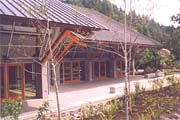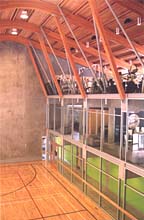
Earth Tech Canada, a business unit of Tyco Engineered Products & Services, recently received an Excellence in Sustainable Design Award at the Integrated Design/Integrated Development (IDID) Conference in Durham, NH, for its design work on the Gleneagles Community Center in Vancouver, BC.
Earth Tech, along with Vancouver-based Patkau Architects, received the award based on their use of green building technologies in the design of the heating/cooling system for the 23,000-sq.-ft. recreational facility. Criteria for receipt of the award included the incorporation of sustainable design elements, the extent of the use of the Integrated Design Process, integration of the overall project with the site and the community, and the use of exceptional design elements. The project was one of just three in the United States and Canada recognized for incorporating the surrounding environment and green building techniques into the design.
Green building technologies, which focus on designing and constructing buildings to include conservation of water and energy, as well as minimizing waste and pollution, are fast becoming the preferred, and even mandated, methods of construction across North America, and throughout the world.
It was on Earth Tech's insistence that such contemporary building methods be used for the community center's heating/cooling system, making it the first of its kind in North America. Despite the system's very non-traditional nature, all involved with the project agreed that green was the way to go.
"Although it was a radical departure from traditional methods, once assured of the fundamentals, the architect, the owner and the general contractor supported the concept," says John Munroe, department manager for Earth Tech's Calgary office and project manager for the Gleneagles project.
The technology behind the heating/cooling system itself dates back to methods developed by the Romans 2000 years ago. This system, known as a hypocaust, was used primarily in Roman bathhouses and employed the use of a raised floor substructure through which warm air could freely circulate. Earth Tech used this basic principle, along with some 21st century know-how, to create a heating/cooling system that used the building itself as a prime component to the system.

"For the Gleneagles Community Center, we took the process one step further and embedded piping in all the walls and floors, through which cooled or heated water is circulated. This way we actually control the temperature of the structure. We generated the cooled or heated water by putting a geothermal heat exchanger under the parking lot of the facility, thereby using the earth's inherent energy to heat and cool the facility."
Other green building techniques utilized in the project include a displacement ventilation system, rainwater collection and low-flow plumbing.
"I think [the use of green building techniques is] very important. The marketplace has debunked the myths that you can't build cost-effective, green buildings," says Munroe.
"The techniques are now well past the "